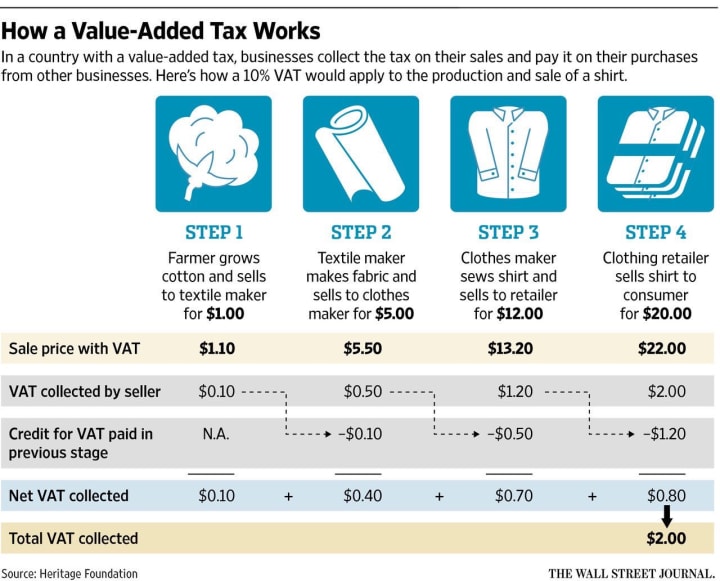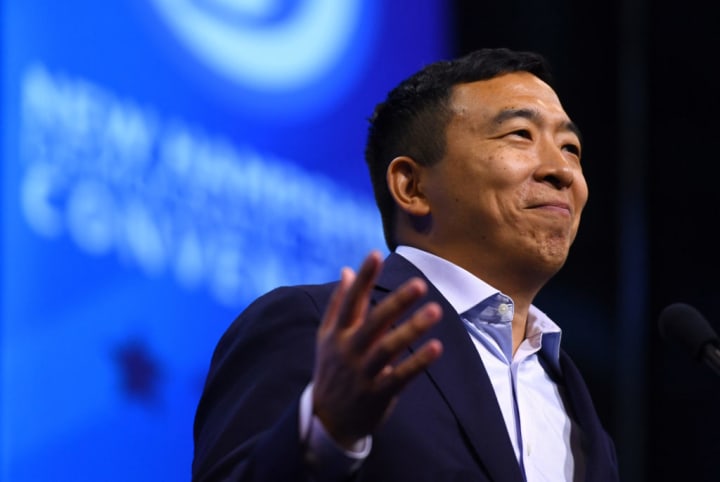Andrew Yang
Our Next President of these United States
Dutch historian Rutger Bregman said, to a standing ovation, at his closing of a June 2017 TED Talk:
Poverty isn't a lack of character; it's a lack of cash.
And he was absolutely right then and he is now.
So when the 2020 Democratic presidential candidates started to rollout their campaigns in early 2019, I was as much interested in them as mainstream media was in covering John Delaney. Why? Because Andrew Yang had already won my vote.
Back in late September of 2018, while I was scrolling through my Facebook feed one day, I came across a NowThis interview clip of a longer-haired, less polished and even nerdier Andrew Yang explaining why he is running for President as a Democrat in 2020 as he tries to sell me on his unconditional (not universal, because it is opt-in and inmates don't receive it) basic income policy pitch of $1K/month, or $12K/year, for every American adult citizen from—originally ages 18 to 64—to, as of four months ago, age 18 until death.
The egalitarian in me was immediately intrigued... but, of course, common sense, as it often does (for many of us anyway), reared its ugly head and dictated, "but how's he gonna pay for it?"
Understandably, I turned my back on this seemingly single-issue candidate and, once again, reserved my seat on the 2020 "Bernie Boat." However, as the fall 2018 season progressed, I found that I just couldn't shake away what I considered then, and still do today, to be the core tenets of UBI; the unconditionality of it all. Terms like "free and clear" and "no strings attached" stayed with me at night as I laid in bed or when I drove to work or while, temporarily, dazing out in one of my post-grad classes.
Because once I knew what would it mean for me and mine, I started to think beyond that and what it would mean for others, like people living paycheck-to-paycheck. People like two-and-three job-working single parents and college and/or high school grads and dropouts stuck in dead-end, slave wage jobs.
Naturally, before long, I started to think about the impoverished people living on spitefully-designed Federal government assistance programs, like TANF, SNAP and WIC, as well as those in dire need of such programs but who are regularly denied access all the same. And then shit got really real when I started to think about the homeless; homeless children.
What is more is that all of this, exceedingly, becomes all the more egregious once you take into account the fact that US child poverty, each year, costs us $500 billion. Or that our defense budget right now, in 2019 alone, is $686 billion, meanwhile, the cost to end poverty, forever, in the US is $511 billion less, at a mere $175 billion.
If this were a play, this would be the moment of the story at which the author would write "Enter... ANDREW YANG."
Because Yang and his flagship policy proposal, the Freedom Dividend, is the most progressive economic policy plan of this, and arguably, any lifetime. Although not a novelty idea in Western civilization, given its 500-year history, it nevertheless retains its revolutionary nature, one that transcends both the passage of time and ideology.
Cases in point:
- 1510—English humanist and statesman Thomas More advocates for basic income to distribute wealth generated as "public lands passed into private ownership."
- 1796—One of America's "Founding Fathers" Thomas Paine calls for a "citizen's dividend," funded by a tax on landowners, be paid to all Americans in his pamphlet Agrarian Justice.
- 1934—US progressive Democratic presidential candidate Huey Long's populist "Share the Wealth" policy platform promises every family a basic income of $5K annually.
- 1962—American conservative economist Milton Friedman advocates for income supplements in cash, or a negative income tax, for the poor to replace social safety net benefit programs.
- 1967—American civil rights leader Dr. Martin Luther King, Jr. expresses support of a "guaranteed minimum income" for all citizens in his final book, before he was assassinated in 1968, Where Do We Go From Here: Chaos or Community?
- 1968—US President Richard Nixon begins a series of basic income experiments to see the effects of free cash handouts on American citizens.
- 1971—US President Nixon's basic income experiments end and the effects on the test subjects are reported to have been all positive.
- 1972—US Democratic presidential candidate George McGovern champions an annual basic income of $12K for every family as his main proposal against Nixon.
- 1980—Friedman, winner of the 1976 Nobel Prize winner in Economics, in his book Free to Choose, wrote:
We should replace the ragbag of specific welfare programs with a single comprehensive program of income supplements in cash — a negative income tax. It would provide an assured minimum to all persons in need, regardless of the reasons for their need, while doing as little harm as possible to their character, their independence, or their incentives to better their own conditions. A negative income tax provides comprehensive reform which would do more efficiently and humanely what our present welfare system does so inefficiently and inhumanely.
Yang's Freedom Dividend, with annual price tag of $2.4 trillion and paid for by a 10% value-added tax (VAT) on the Big Tech industry at every stage of production, in addition to, the highest spenders of the economy, is three-fold...

Because,
1) It ends poverty (remember: only $175 billion to eradicate) and living paycheck-to-paycheck;
2) It finally captures a sizable amount of net gains from the richest 1% of Americans that Bernie Sanders and other Sandersonian politicians have railed against on paying their fair share in taxes for years if not decades;
3) And, lastly, it generates billions of dollars in new revenue, which in turn bolsters GDP, and thus allows us to vastly improve everything from infrastructure and public school education to housing and HEALTHCARE!
Suffice it to say, these are massive public goods of epic proportions, and if Yang remains the sole 2020 presidential candidate championing unconditional basic income funded largely, in part, by a value-added tax...

...then, in every practical sense, Andrew Yang is, quite simply, the only candidate in the entire clown show of this election cycle that is worth a goddamn. And, that alone, is why he should and must become our next President of these United States.






Comments
There are no comments for this story
Be the first to respond and start the conversation.